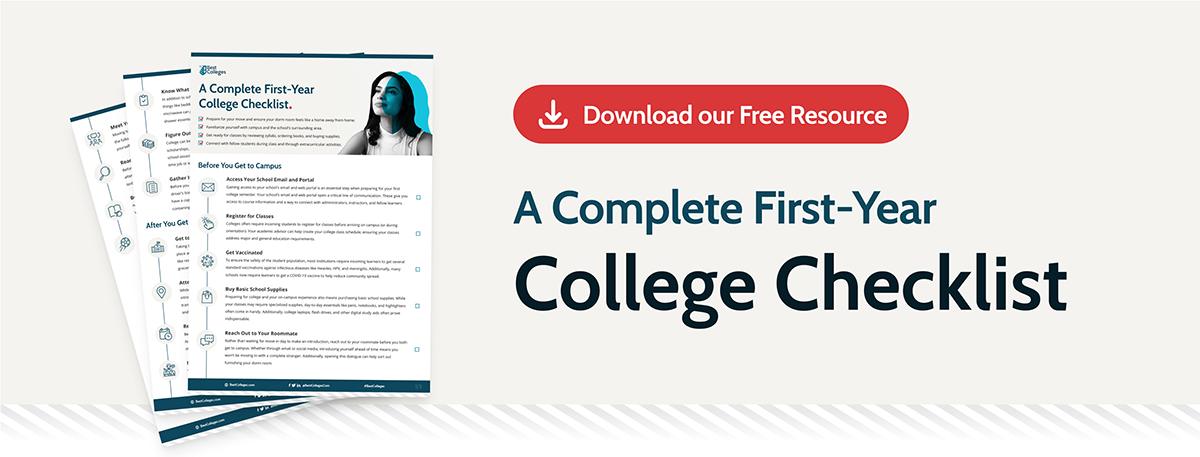A Complete First-Year College Checklist
Starting college can be daunting. But taking time to prepare yourself for your classes and overall college experience can help ease the stress of this transition.
By taking action on college-related tasks, such as buying school supplies, planning your class schedule, and choosing a loan repayment plan, you can spend more time and energy enjoying your new routine once you start school.
The following college checklist covers important things to consider, both before and after you get to campus. Many of these action items also apply to online students and those commuting to campus.
Read on to learn how to prepare for college and make the most of this unique experience.

Before You Get to Campus
There are lots of things you should think about and address before you set foot on campus, from registering for classes to figuring out financial aid.
Access Your School Email and Portal
Gaining access to your school’s email and web portal is an essential step when preparing for your first college semester. Your school’s email and web portal open a critical line of communication. Through these, you’ll get access to course information and a way to connect with administrators, instructors, and fellow learners.
Register for Classes
Colleges often require incoming students to register for classes before arriving on campus (or during orientation). Your academic advisor can help create your college class schedule, ensuring your classes address major and general education requirements.
Get Vaccinated
To ensure the safety of the student population, most institutions require incoming learners to get several standard vaccinations against infectious diseases like measles, HPV, and meningitis. Additionally, many schools now require learners to get a COVID-19 vaccine to help reduce community spread.
Buy Basic School Supplies
One big part of preparing for college is buying basic school supplies. While your classes may require specialized materials, day-to-day essentials like pens, notebooks, and highlighters will come in handy. Don’t forget to also buy a laptop, flash drive, and any other digital study aids you may need.
Reach Out to Your Roommate
Rather than waiting for move-in day to make an introduction, reach out to your roommate before you both get to campus. Whether through email or social media, introducing yourself ahead of time means you won’t be moving in with a complete stranger. Opening this dialogue can also help sort out furnishing your dorm room.
Know What to Pack
In addition to school supplies, picking up some college dorm room essentials is critical. Start with things like bedding, toiletries, and seasonally appropriate clothing. A TV, mini-fridge, and microwave can go a long way in adding comfort to your room.
You should also consider storage solutions, lamps, and shower essentials like a robe and flip flops.
Figure Out Financial Aid and Pay Tuition
College can be expensive, and costs may include tuition, books, and room and board. If you get funding through scholarships, grants, or loans, make sure you know how to pay your bills.
While financial aid can help cover school-associated costs, unplanned expenses may require seeking out additional income through a part-time job or work-study job.
Gather Important Documents
Before you get to campus, gather essential college documents, such as your driver’s license, your Social Security card, and a copy of your birth certificate. You should also ensure you have a copy of your health insurance card.
Bringing official school documents to campus, such as those containing scholarship or financial aid information, is a good idea, too.
After You Get to Campus
So you made it to campus. Now what? Familiarizing yourself with your new home can help ease the transition into college life. Read on for some post-move-in tips.
Get to Know the Campus and Surrounding Area
Taking time to explore campus and the surrounding area can make you feel better about moving to an unfamiliar place and add to the excitement of living somewhere new. Familiarize yourself with on-campus essentials like residence halls, libraries, and class buildings.
And don’t forget to seek out a few off-campus spots, like cafes, grocery stores, and restaurants.
Attend Orientation
While you might have visited your school before enrolling, attending orientation offers a formal introduction that provides you and your peers with essential information to help you acclimate to college life.
At orientation, you can introduce yourself to future classmates, meet professors, and familiarize yourself with campus facilities. Additionally, many students take advantage of the opportunity to talk with an academic advisor to discuss their academic goals and class schedules.
Review Your Class Schedule
Before classes start, review your schedule so you know when and where your classes are. If you want to adjust your schedule, talk to your advisor. Most colleges allow you to add or drop classes within the first couple of weeks of a semester.
Memorize Where Your Classes Are
When getting to know the campus, try to memorize the location of your classes. Knowing class locations can help you get from class to class efficiently and with less stress. Rolling into class late on the first day is not the best way to make a good first impression.
Meet Your Floormates
Moving to a new place with many unfamiliar faces can feel overwhelming. However, introducing yourself to the folks you see daily and making friends at college will help ease the transition. Do your best to put yourself out there, meet your floormates, and have fun.
Read and Print Out Your Class Syllabi
Before classes start, read over your class syllabi. Getting to know your professors’ expectations and attendance policies will put you on a path toward success. You should also know what reading materials, textbooks, and supplies you’ll need for the semester.
Buy or Rent Textbooks
Many classes require students to have access to expensive textbooks. Your budget will help you figure out whether you should buy or rent textbooks, use e-books, or shop for books online.
Attend a Student Activities Fair
Attending a student activities fair facilitates on-campus engagement and helps you meet like-minded students. Engaging in extracurricular activities can also bolster your resume. Through sports, cultural events, and civic engagement, you can make friends outside the classroom and enliven your college experience.
Explore More College Resources

How to Find Scholarships for College Students: Top 12 Resources
Wondering how to get scholarships for college to help with tuition? Explore the best resources for college scholarship searches and databases.

by Kasia Kovacs
Updated May 16, 2023




